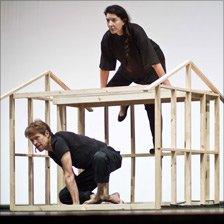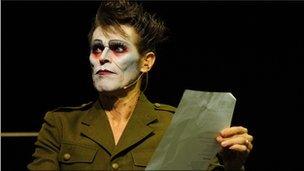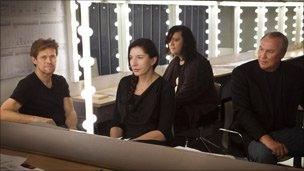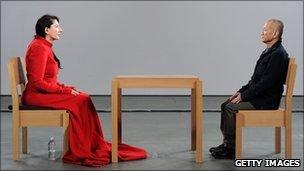Marina Abramovic stages life and death
- Published

Actor Willem Dafoe appears on stage with Abramovic. Photo: Antony Crook
Performance artist Marina Abramovic has spent 40 years pushing her own mental and physical limits.
This weekend in Salford, the 64-year-old is starring alongside actor Willem Dafoe in a stage show about her life and her imagined death.
When Marina Abramovic dies, she will have three coffins.
One will contain her real body and two will contain fakes. No-one will know which is which.
They will be buried simultaneously in her home city of Belgrade, Serbia, plus Amsterdam and New York, Abramovic has decided.
This is the grand dame of performance art - a living artwork who puts herself in extreme situations in order to light up parts of our life that we rarely explore.
With a deep, expressive voice, a single-minded artistic vision and a commanding presence, she is the ultimate drama queen.
And she sees no reason why that performance should stop when she dies.
"I recently have been part of so many funerals of friends of mine," she explains.
"And I was horrified how the relatives and family misunderstand the personality and how they make the funerals. I was thinking, it's not going to happen to me."
So she made a will which dictates the elaborate choreography that will govern her funeral.

Dafoe appears as a narrator and figures from Abramovic's past. Photo: Omid Hashemi
But before that day comes, those three coffins are used as a starting point for the new theatrical production The Life And Death Of Marina Abramovic, which opens at The Lowry in Salford on Saturday.
After depicting her imagined internment, the play, part of the Manchester International Festival, then jumps back in time and tells the traumatic story of her life.
The daughter of Yugoslav military heroes, she made her name through a series of startling performances, such as the one in which she systematically stabbed her hand with knives.
In another, she whipped herself, before cutting a five-point star in her stomach with a razor blade and lying on a cross made of ice.
She nearly died when she lay in the middle of a burning cross made of petrol-soaked sawdust, and on another occasion allowed an audience member to hold a loaded gun to her head.
Abramovic says she has always strived to use the body as a tool for making art.
"We're so afraid of pain, we're so afraid of suffering, we're so afraid of things we don't know," she says.

The show was directed by Robert Wilson (right) and features singer Antony Hegarty (second right). Photo: Antony Crook
"So we always choose the easy way. And when you choose the things you like to do, you never change.
"I stage dangerous situations in front of the audience. I use the energy of the audience in order to push these limits and show the audience, if I can do it in my life, they can do it in their own.
"If you trust in pain, you come to another level of consciousness. That's the only way."
As her career went on, her performances became extreme and uncomfortable in different ways.
With lover and collaborator Ulay, she stood naked and still in a gallery doorway, forcing people to brush past them if they wanted to get in.
More recently, some 560,000 disciples visited a major retrospective at the Museum of Modern Art in New York.
That show involved Marina sitting impassively for more than 700 hours as fans queued to sit opposite her and stare into her eyes.
Some found themselves strangely overwhelmed by the experience, and a website, Marina Abramovic Made Me Cry, external, was set up to show those who were moved to tears.
"I had a very simple structure of a table and two chairs, and everybody knew there's nothing going to happen," she says. "It's not crescendo, it's not big story.

Last year, Abramovic took part in a 700-hour performance at the Museum of Modern Art
"With this kind of nothing, actually everything happened. We had 1,700 people sitting in these chairs looking at me. We had people waiting in front of the museum all night to do it."
She was transmitting "something immaterial which you can't explain rationally or visibly, but which affects people", she believes.
"And to me, the main aim of my art is this kind of transformation - but also lifting the spirit of human being."
Now, she has enlisted acclaimed American avant garde director Robert Wilson to put her life and death on stage.
Joining her will be Willem Dafoe, known for Platoon, Spider-Man and The English Patient, who appears as a demonic, cartoonish narrator.
The singer Antony Hegarty, of Antony and the Johnsons, has composed the music and is a haunting presence on stage as he performs it.
As a performance artist, Abramovic used to hate theatre, she says, explaining: "The knife is not a knife, the blood is not blood. It's all fake."
But after a painful split from Ulay in 1988, she decided that she would rather work through her emotional pain by re-enacting her story on stage.
She now asks a different director to stage her story every seven or eight years, handing over all her personal diaries and letters for them to use.
"But one condition is that I give up total control," she says.
"I have complete control about my work, I don't want to have control about my life. And that is a really wonderful experience."